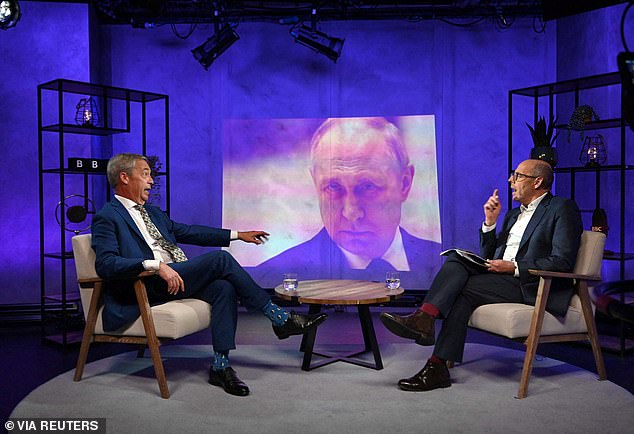MAIL ON SUNDAY COMMENT: Farage is no Trump – his soft spot for Putin endears him to no one
A man who wants to become prime minister can no longer just say whatever he wants. From the moment he expresses that ambition, he is judged by much stricter and more intrusive standards than before.
He doesn’t just have to be careful in the future – he also has to be careful in the past.
He should expect things he said years ago to be thoroughly investigated. This has now happened to Nigel Farage, the leader of Reform UK.
Mr Farage may have been a little giddy with success when he recently announced on Radio 4 that he planned to make a bid for Downing Street at the next election, probably in 2029.
He explained that he hoped to use the current battle, in which Reform UK is unlikely to win many seats, as a springboard.
Nige Farage said he would not apologize after political leaders criticized his claim that the West pushed Putin to invade Ukraine.

Farage told the Telegraph on Saturday that he was not an “apologist or supporter of Putin” and described Russia’s invasion of Ukraine as “indefensible” but claimed the West had made “catastrophic” mistakes during the conflict.
Mr Farage did not behave as most politicians do when confronted with questions about his high expectations. He didn’t try to sidestep the issue or pretend he didn’t want to occupy Number 10. He has seen his friend Donald Trump climb to the Oval Office with sheer outrageous nerve and by breaking all the rules. So why not him?
Well, that could work in the US presidential election. But perhaps Mr Farage, for years a gadfly and a guerrilla, does not fully understand how many obstacles and safeguards our parliamentary system puts in the way of a lonely maverick.
Mr Farage has never minded being in the spotlight. But can he resist a searchlight? It seems like he can’t.
The BBC’s Nick Robinson didn’t even have to lure him into danger when he asked about Farage’s comments about Russian leader Vladimir Putin. He was already in danger.
For some time now, even before Putin’s invasion of Ukraine, all major parties have agreed that supporting Ukraine against Moscow’s aggression is a prerequisite for anyone who wants to be in charge of national security.
While we are not actually at war with Russia, we are closely allied with Ukraine and have been victims of Russian crimes on our soil. So we must maintain a united front against the Kremlin and its propaganda.
And this is not just the opinion of the elite. British public opinion is largely on the same side.
Sympathy for Putin, or even an attempt to explain his actions, is considered little better than sympathy for Hitler, as Reform UK will discover in the coming days.
Mr Farage has a history of this that goes back a long way. His fierce opposition to the Brussels establishment while in the European Parliament took him into dangerous territory, where millions of his current supporters will not want to follow him. It may have once seemed to him that anti-EU sentiments logically led to sympathy for Russia’s position on the westward expansion of both the EU and NATO. Now the expansion is going in the other direction and is being carried out with tanks and bombs instead of diplomacy and subsidies.
As a result, his long-ago positions, which he still tries to defend, look like a serious liability. They also leave voters wondering how much more about the reform leader and his party needs to be carefully examined. What does he actually stand for, other than a vague, brutal opposition that has never been tested in government?
Reforms continue to stun the nation by choosing unqualified candidates, presumably chosen because no one believed they would have the slightest chance of winning. It seems they were right about this.
Mr Farage has suffered a major blow, and he has only himself to blame.
